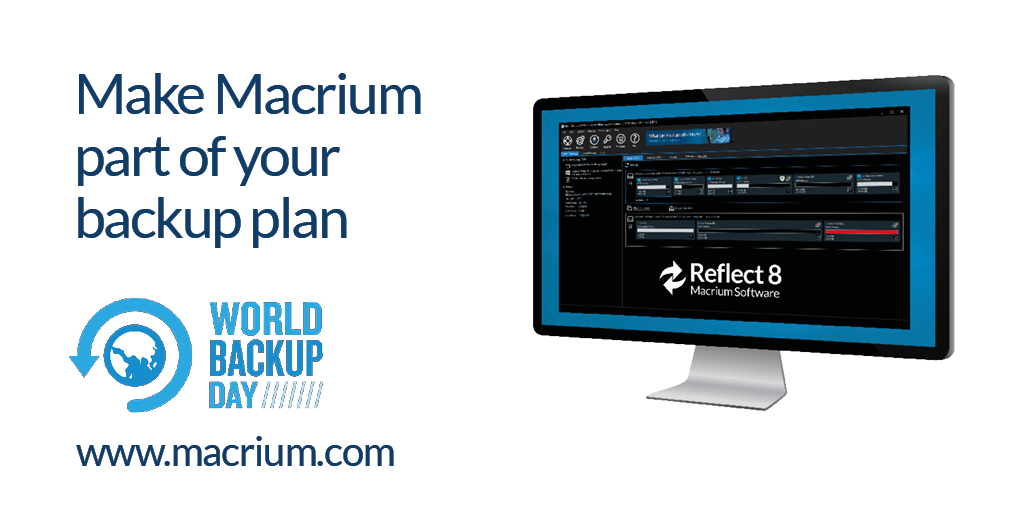World Backup Day 2023

Spring is here! Which means it’s also time for *drum roll please,* you guessed it, World Backup Day! It’s fair to say that World Backup Day on the 31st of March is a pretty big deal for us here at Macrium. This day serves as an important reminder of why we need to backup our most valuable resource—data! So while you’re buying Easter eggs, planning some April fools pranks and doing your Spring cleaning, don’t forget the all-important task of backing up your data. The last thing you want while having a spring de-stress, is to suffer data loss distress!
And if you’re thinking, “I probably won’t need it…” think again. According to a 2022 survey by Backblaze, losing data is more common than you think. The survey showed eye opening stats on how computer owners lost their data:
- 67% report accidentally deleting something
- 54% report having lost data
- 53% were affected by a security incident
- 48% had an external hard drive crash
- 21% of those crashes have happened in the last year
- 44% lost access to their data when a shared drive or synced drive was deleted
Yikes!
Data loss can be easily avoided if you backup your data regularly. Ideally your data should be backed up every day. However, according to World Backup Day, 21% of people have never made a backup, and 30% of all computers are already infected with malware. World Backup Day is to remind us of the importance of being prepared against data loss and theft. As you may have guessed, at Macrium, we are passionate about backup! So on this day, we want to share some useful information on:
- Different types of backups
- How to recover your data
- Our effective 3-2-1 backup strategy
What is a backup?
A backup is a copy of your files, stored in a safe place. It could be important files such as documents, family photos, emails or videos. In a situation where you’ve been affected by data loss or if those files have been accidentally deleted, you can be reassured in knowing that you have an up-to-date backup of all your files and can restore them easily. As a result, a data loss event which could be disastrous, is now just a minor setback.
Different types of backups:
Macrium Reflect 8 lets you create file and folder backups, disk images and clones to backup your data. Here we explain the difference between the two so you can decide what is the best option for you.
File and Folder backup
File and Folder backup is a useful way to backup your working and personal files as well as your data. It can also backup complete drives with the files included. Macrium Reflect 8, for example, can backup open and locked files using Microsoft Volume Shadow copy service. You can backup your documents folder and save the backup configuration as an XML file for easy re-running and scheduling.
Disk Imaging
Image backups differ in that it copies an entire partition including all the bits and bytes on a hard drive partition. A disk image stores the data required to restore disks or partitions to the state that they were in when the disk image was created. The data is compressed into an (.mrimg) image file and can be restored at a later point in time.
Disk images are a reliable way to back up the data that is stored in your partitions and disk, however it can be more time consuming depending on the amount of data that needs imaging. This can also quickly fill up the storage in the destination in which you are storing your data.
Incremental and differential images
This is where incremental and differential images come in. The changes that have occurred since a previous image was created can then be saved using a differential or incremental backup — reducing the amount of time that an image takes and creating a smaller backup file.
Differential images will only backup the changes that have occurred since the last full image. Incremental on the other hand will backup the changes that have occurred since the last image of any type. This allows you to create a more comprehensive backup strategy. These images can then be restored to new hardware or archived to store long-term records for future use.
Cloning
Whereas a disk image creates a compressed file containing a copy of the data that you specified, a clone will copy the exact disk or partitions uncompressed onto the destination disk. Cloning lets you replicate data from one drive to another very quickly, however to do this, both the source and destination must be connected to the computer simultaneously.
Find out more about disk images versus clones in our blog post here.
How to recover your data?
Macrium’s trusted backup software does an incredible job of not only backing up your data automatically, but also ensuring that it is easily restored. After all, what is the point in creating all these backups if they aren’t there for you in the darkest hour?
Macrium viBoot makes restoring your data simple! This feature lets you boot onto the image you have made using Macrium reflect, for validation purposes, or to retrieve data from old applications stored on a bootable image. Watch our video to see how easily you can backup and restore your data.
3-2-1 backup strategy
Finally, when it comes to backing up data, we recommend using the 3-2-1 backup strategy:
3 copies of your data - Redundant copies of your data ensures that if one or more of the copies becomes unavailable or corrupted due to hardware failure, you will still have a copy available.
2 local copies on different storage types - This ensures that if one of the local copies of your data becomes unavailable or corrupted due to hardware failure, you will still have another local copy to easily restore.
1 backup off-site - In the event that your local copies are no longer available, you still have an off-site copy that can be used. As the old saying goes: “don’t put all your eggs in one basket”. Off-site copies mitigate the risk of events that can affect all local copies simultaneously, like natural disasters or theft.
Beyond World Backup Day
If you’d like to learn more about how Macrium can help you, your business, or your organization make sure a data loss doesn’t mean a data disaster, get in touch! Our helpful conversation starter in the bottom right of your screen is a handy choice, or contact us in another way.


